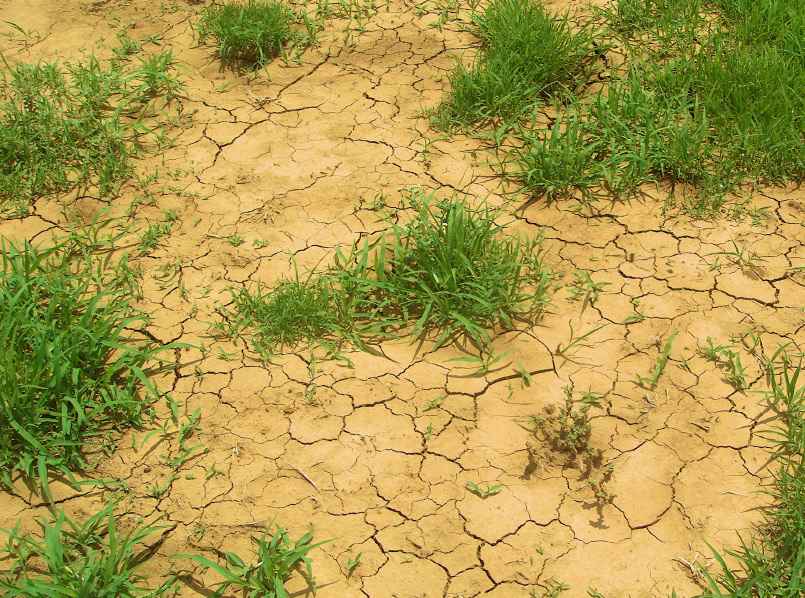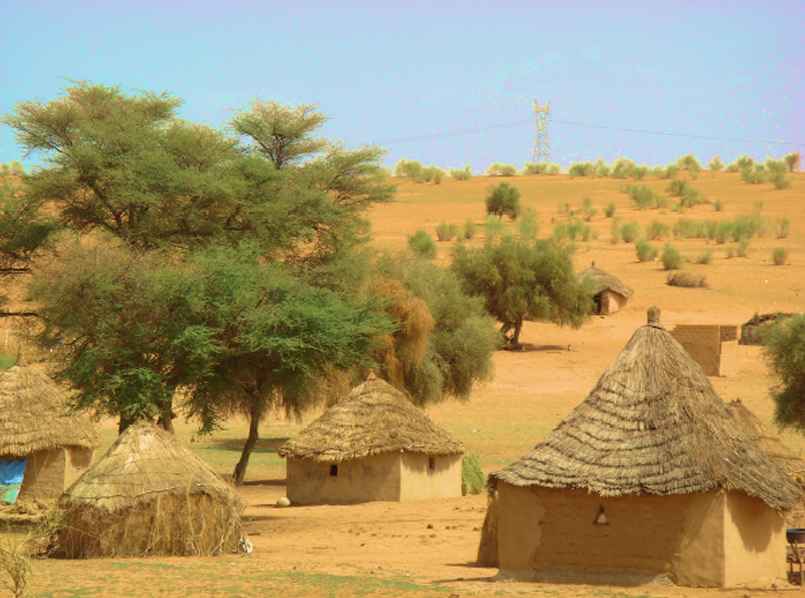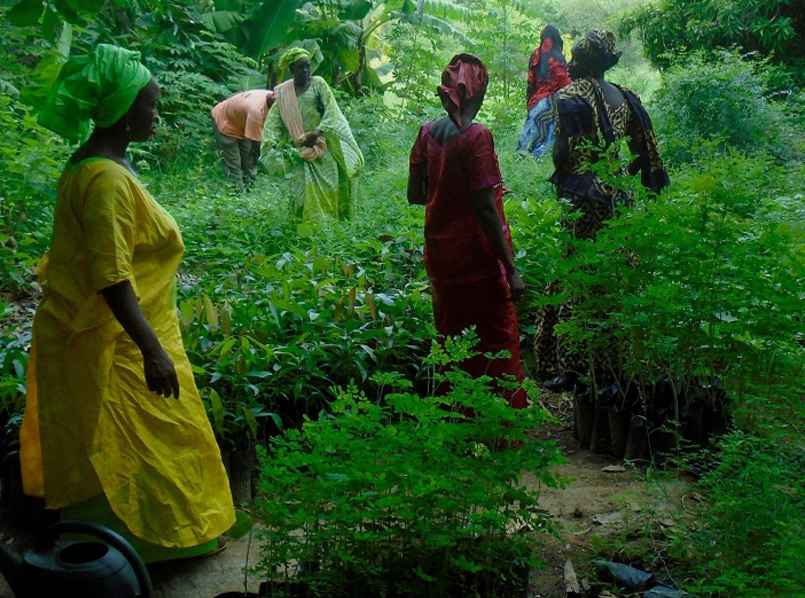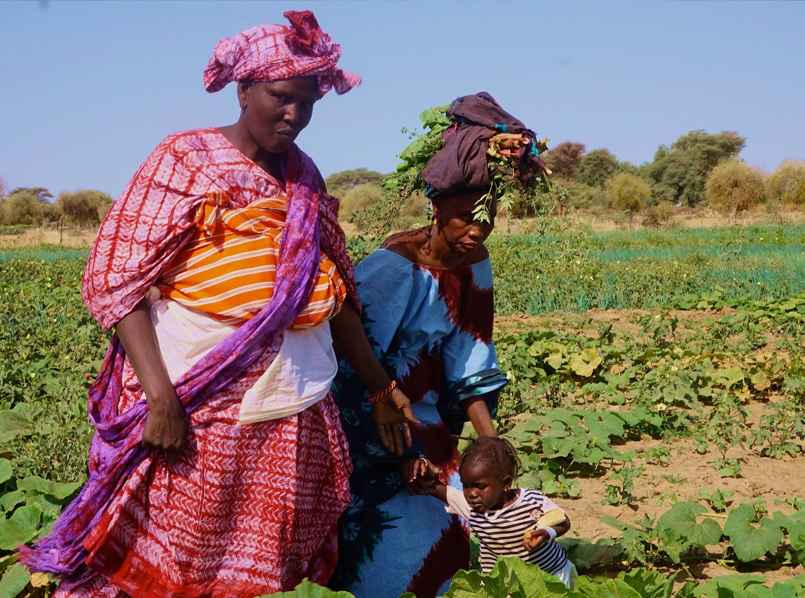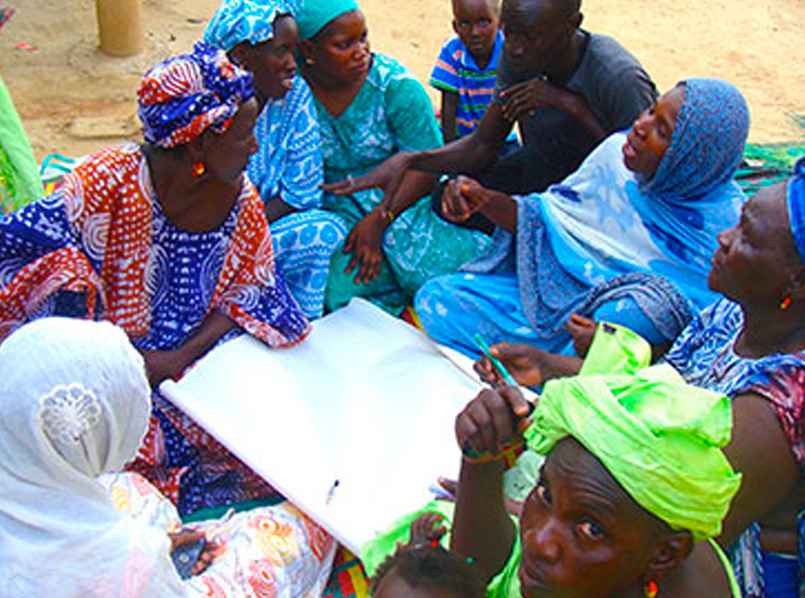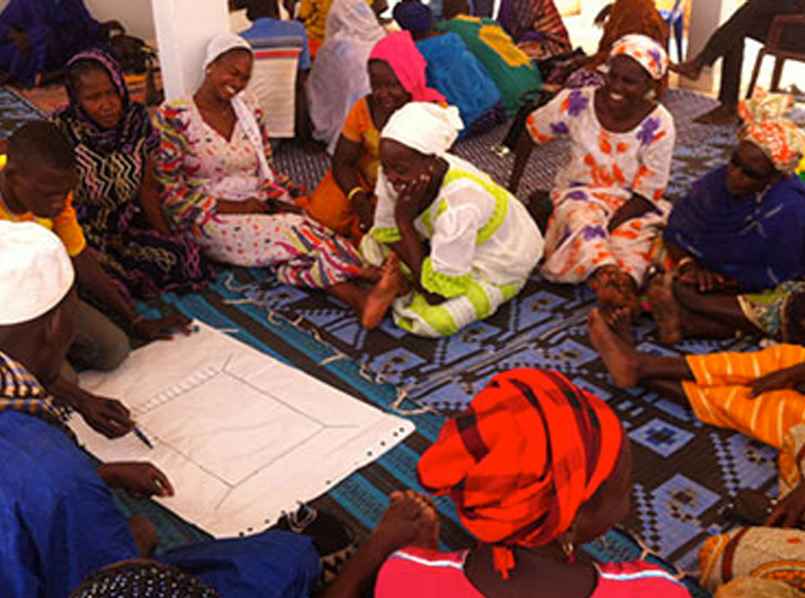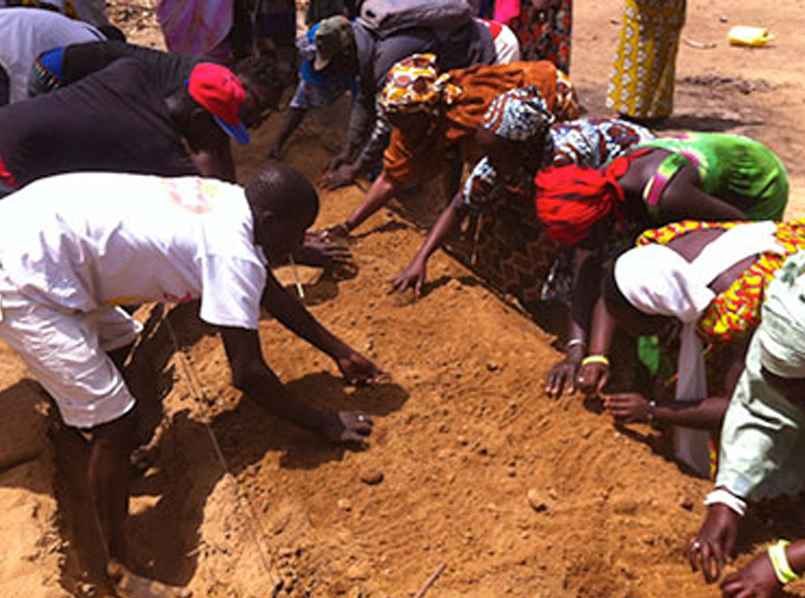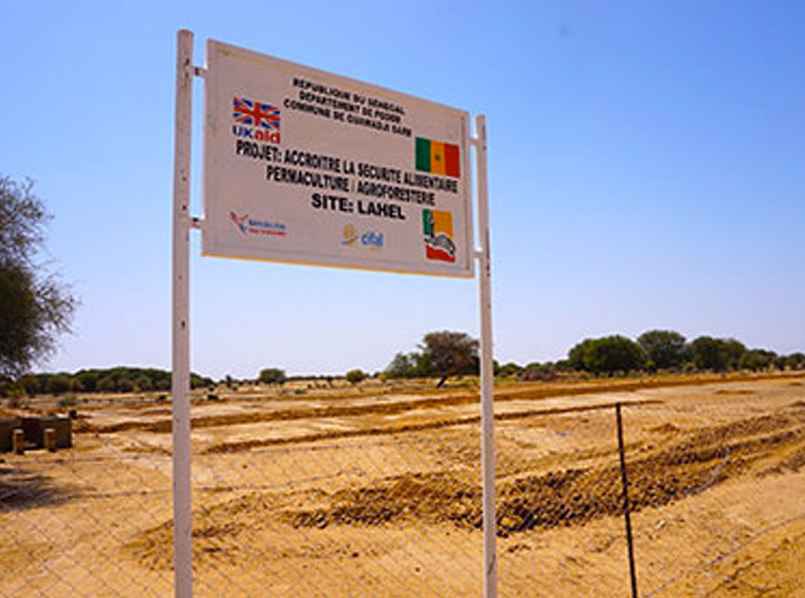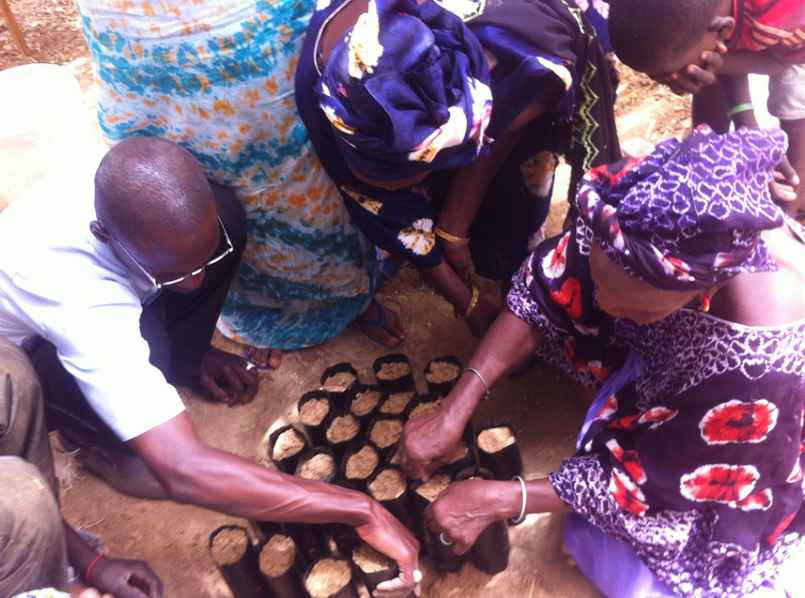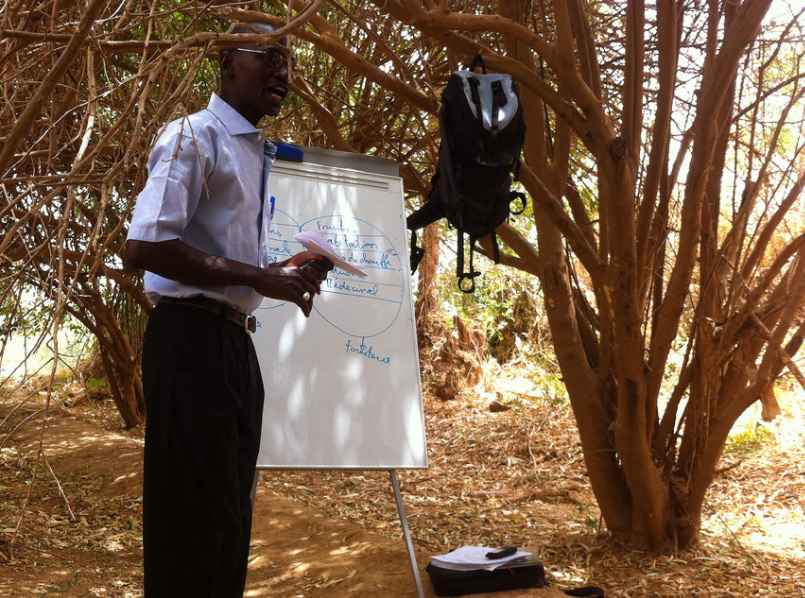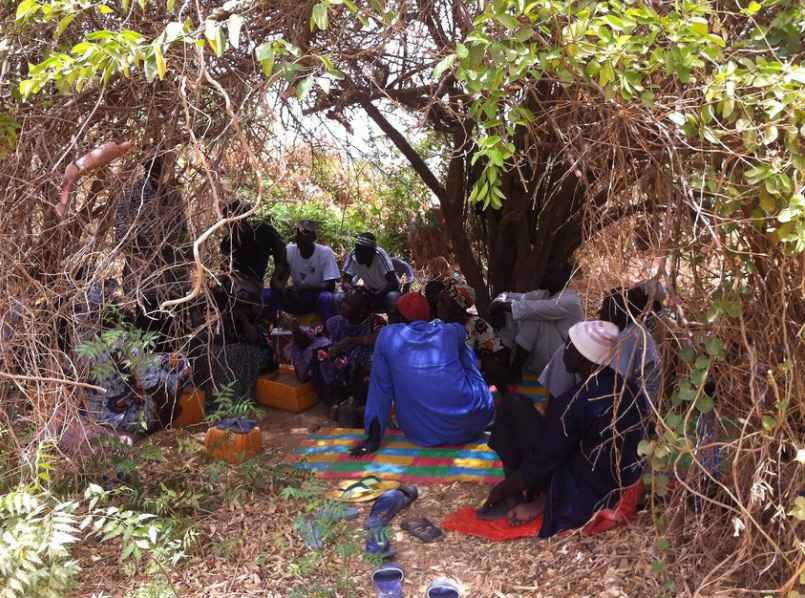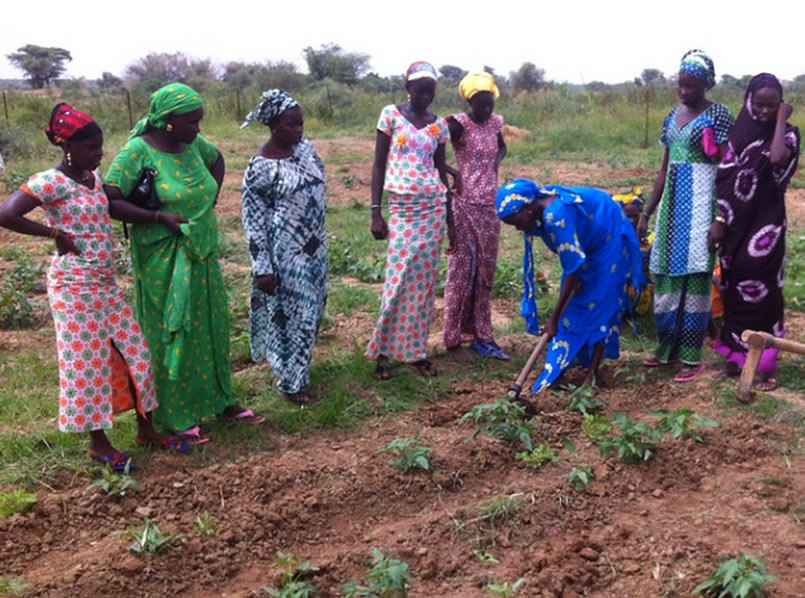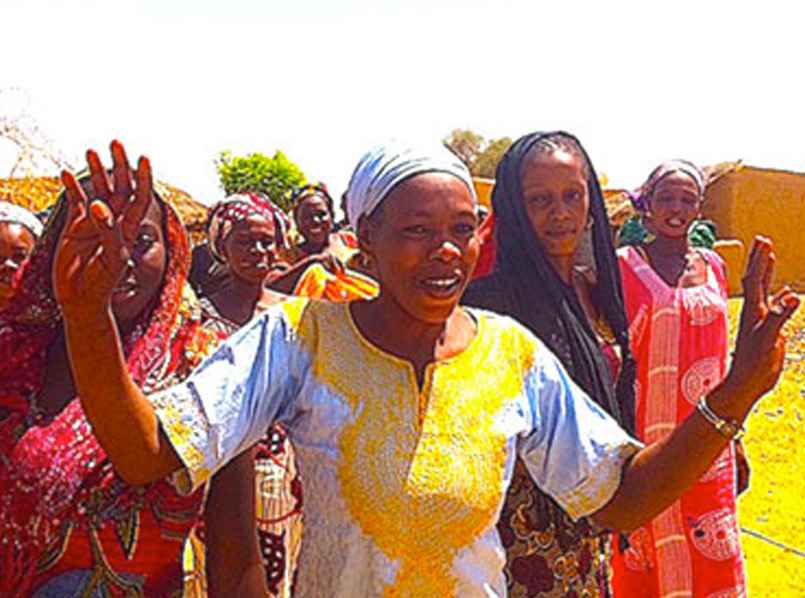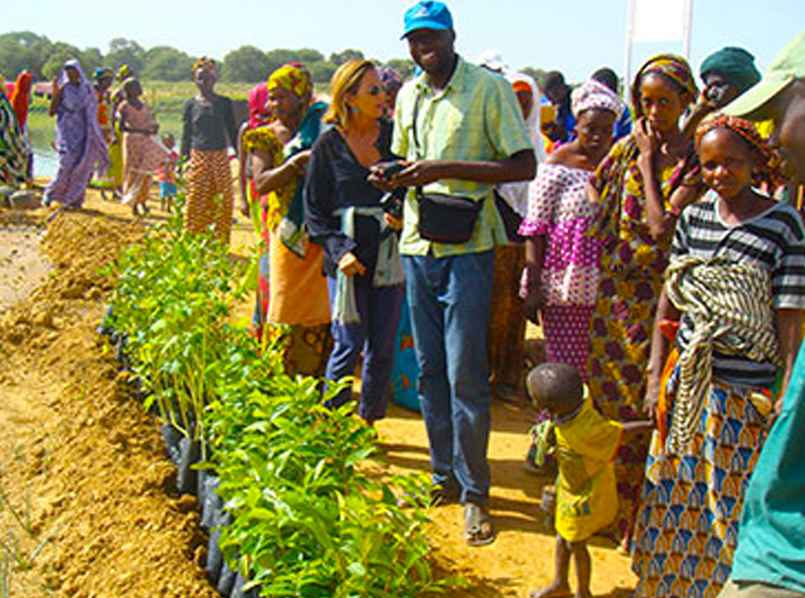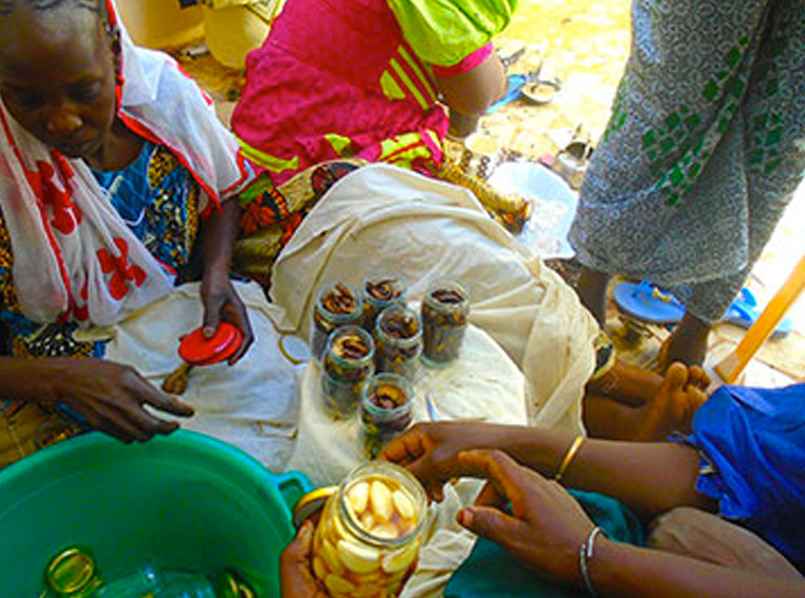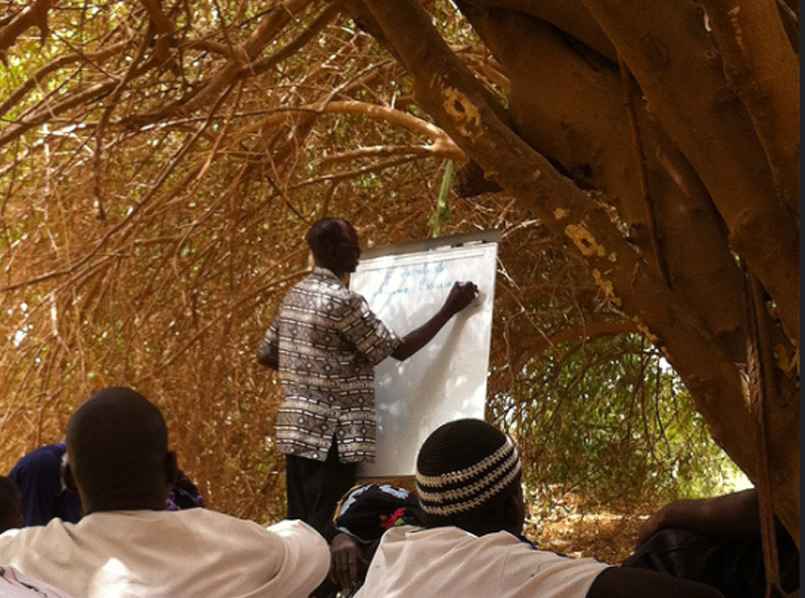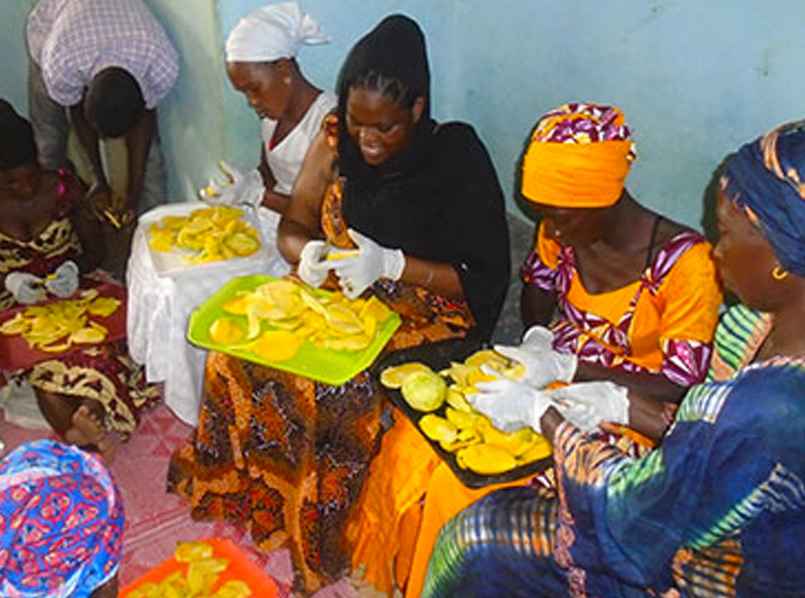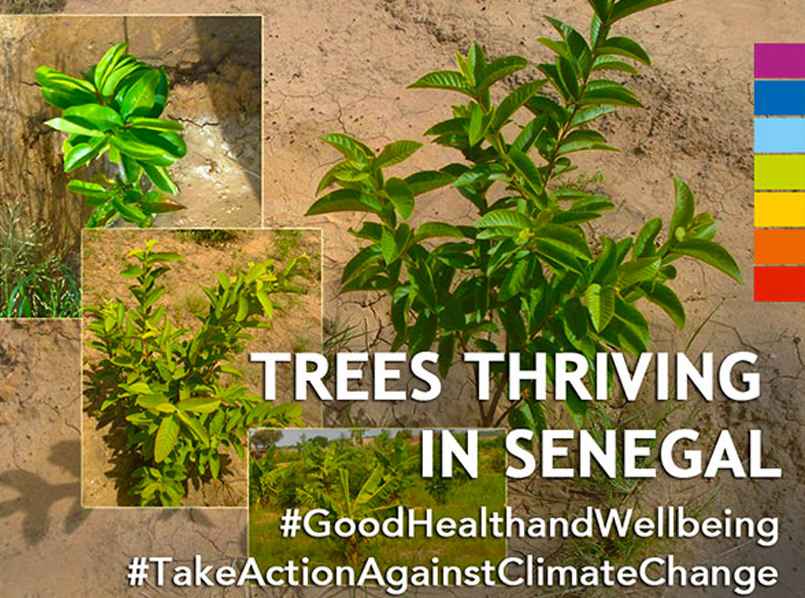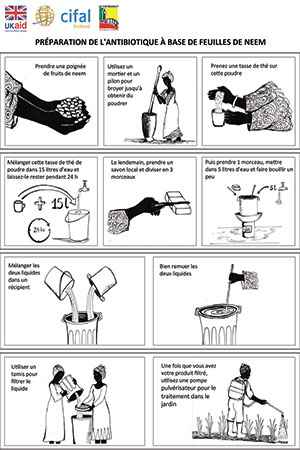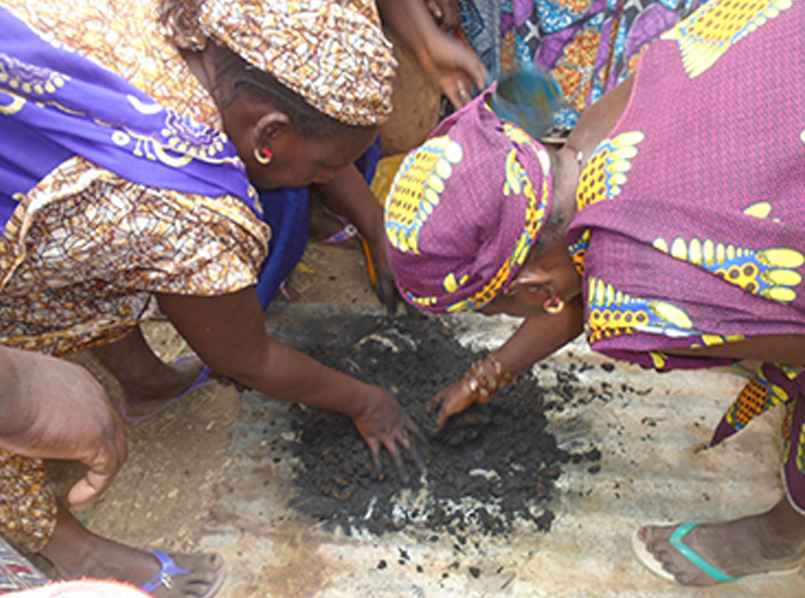Increasing Food Security, Income Generation & Environmental Sustainability in the Podor Region, Northern Senegal
Project funded by UK Aid
April 2014 to March 2017
This three-year food security project engaging four villages of the Podor Region of northern Senegal – Guédé Chantier, Lahel, Moundouwaye and Diarra – supported female villagers to adapt 16 hectares of community land to produce organic food more efficiently, and increase the communities’ resilience and capacity to adapt to the advancing effects of climate change.
The project strengthened the communities’ social, economic and ecological competence and built skills in agroforestry, permaculture, food processing and social enterprise. It directly benefitted over 3,000 community members, 85% of whom were women.
In recognition of the project's success, our funder, UK Aid Direct, awarded the project an A-rating.
Gaia Education, CIFAL Scotland and Le Partenariat came together as partners to support these dynamic women.
Project Film
Context
The agricultural viability of small-scale producers in the Podor region of Senegal is under threat. On top of the transfer of productive land from food production for local needs to export for consumption by global consumers, misguided industrial agriculture policies over the decades have undermined traditional methods of food production. This process are turning the once productive soils by the River Senegal into a barren wasteland.
The difficult situation is compounded by the relentless desertification of the Sahel due to climate change, forcing small-scale producers to continually adapt with innovative solutions to keep feeding their communities.
The women of Podor decided to take an active part in reversing the progressive destruction of their life support systems, both by the forces of climate change and globalisation.
With the support of the project partners, they decided to harness their creative efforts and revive traditional ways of farming. This would ensure their families’ security and well-being, and in the process, reclaim their land and their sovereignty.
Approach
The international and regional experts of Gaia Education conducted a series of capacity-building trainings in permaculture, agroforestry and food-processing, with practical activities to directly implement learning.
The trainers were careful to combine both indigenous and scientific agroecological knowledge to create productive systems which could be easily continued post-project.
Agroforestry nurseries were initiated in each village teaching beneficiaries skills in raising tree seedlings to replace trees that perish, creating agroforestry systems that could continue post-project. This approach is 250 times cheaper than purchasing trees.
Agroforestry practices began regenerating the fragile ecosystem by storing carbon, preventing deforestation, increasing biodiversity, protecting water resources and reducing erosion.
Several women were trained in pump operation and maintenance for water management, and all received Processing and Preservation trainings during beneficiary-led demo events.
To be able to share all they had learned, the women were given Change Agent training, building skills in participatory leadership and decision-making, and ecovillage planning. They were then supported to train others.
Results
By the end of Year two, the project was already seeing outstanding results in the permaculture gardens. There was an abundance of produce, and surveys related to the permaculture gardens conducted in March 2016 by local Monitoring and Evaluation agents trained by the project (Eco-sentinels) showed 100% of the students were using compost, 80% liquid manure and 55% fish tonic – the three main permaculture techniques promoted by the project.
The permaculture techniques resulted in the cessation of the use of agrochemicals on the 16 hectares. Soil nutrient tests performed in March 2016 and compared to January 2015 showed the project had increased phosphorus and potassium levels without chemical additives.
Additionally, villagers were now producing and consuming a more diverse array of food, which is improving nutrition and health.
Of 120 farmers surveyed in March 2016, 100% said they no longer spent anything on chemicals, 97% said they consumed a more diverse diet, 100% said they bought less from the market, while 82% reported an increase in food production.
For the future
Together, the women of Podor continue to harness their creative efforts, reviving traditional ways of gardening to ensure their families’ security and well-being, and in the process, reclaiming their land and their sovereignty.
We are sure there is no stopping them now!
Project Milestones
Year 1 Milestones at Guede Chantier, Moundouwaye, Lahel and Diarra
Milestone 1: Scenario Planning and Transition Training
Conducted by Transition Trainer and educator May East, a total of four community consultation and training sessions were carried out to launch the project in Lahel, Diarra, Moundouwaye and Guédé, with a session for women only.
Key outcomes included:
-
Identification of the impact of climate change on their lives
-
Comparison of food production between three-decade-old practices and modern day
-
Identification of the produce they aspired to cultivate within the life-time of the project and beyond
-
Creation of a community vision and a plan of action
Milestone 2: Permaculture Design Course
The first Permaculture Design Course was conducted in two parts, December 2014 and February 2015, for 45 villagers representing the four communities. Conducted by biologist and permaculture expert Prof Abdourahmane Tamba, the course introduced plants that have adapted to the harsh local conditions and can perform multiple ecosystem functions at the same time, such as pest control, soil improvement or provision of fodder and firewood. The introduction of vetiver grass was adopted and vegetable garden plans were created to enable their lands to withstand floods, drought and climate change. The course involved practical and design sessions reinforcing the practices of permaculture. From the PDC course villagers started to develop plots in their villages.
See more photos here.
Milestone 3: Design for Sustainable Settlements course
Conducted by Community Development Trainer Pradyut Nayek, the Design for Sustainable Settlements course engaged 90 participants from the four villages in March 2015. The course provided climate resilient techniques for food security and livelihood development.
At the end of the 10-day capacity-building activities, participants were able to:
-
recognise key concepts of sustainable farming to counteract soil erosion
-
develop natural techniques for pest control and decrease pest susceptibility
-
practice composting techniques for increased soil fertility
-
design water collection techniques and apply them to enable the creation of a natural underground source in a few years
-
use ecological and traditional methods of food production to sustain their crops
-
explore creative and deductive design in the context of their settlements
See photos here.
Milestone 4: Fencing and Land Preparation
Once the agroforestry and permaculture plots were identified and design plans were created, land preparation became a key activity of Year 1. The first steps of the process were fencing, irrigation systems, vetiver planting and collection of organic material to restore health to the poor soils, provide erosion control, aid water conservation and support crop protection.
Year 2 Milestones at Guédé Chantier, Moundouwaye, Lahel and Diarra
The second year has closed with a remarkable success. The combination of learning activities and community engagement has changed the food landscape, empowered women, increased climate resilience and enhanced their livelihoods. Furthermore we installed five pumps and 14 hectares worth of fencing. A big year all in all!
In Diarra 126 women engaged in the permaculture garden and 115 men involved in the agroforestry have closed the second year with a garden bursting with a large variety of vegetables such as onion, tomato, lettuce, eggplant, carrot, turnip, big and small chilli, pepper, combo, melon, papaya, bananas and more. Women associate their good health and well-being with the quality of the food since they are only using organic methods for food production.
Similar progress is occurring in Moundouwaye, where 106 women are engaged in the 2.5 hectare permaculture garden and 166 women are developing two hectares of agroforestry. The year ended with the largest harvest in the history of the village where women practising agro-ecological approaches promoted by the project have turned their arid soil into productive soil again. They are so happy with their self-sufficiency and that they have not had to go to the market to buy food for a whole season.
In Guédé Chantier 215 empowered women are working in the 1.25 hectare permaculture garden, utilising natural pesticides including fish tonic, and both liquid and solid manure. Part of the plot has been suffering from soil salinisation and local techniques including mulching and saline prone plants such as peanuts and sweet potato, will be adopted in the next growing season to counteract this challenge.
In Lahel, women developing one hectare of permaculture garden are growing onions, cabbages, tomatoes, cucumbers, carrots, turnips, beetroot, chillies, eggplants and mint, while men have helped to fence the agroforestry plots, waiting for the irrigation system to be installed to start the plantations.
Milestone 1: Agroforestry Training
Conducted by agroforestry expert Mohamed Marigo in April 2015, the training aimed to strengthen the communities’ ability to manage their agricultural land through agroforestry technologies, to improve farm productivity and increase their availability to nutritious foods.
Topics included: substrate preparation, technical forestry nursery, hole digging, composting, mixed cropping and plantation. By the end of the course villagers were able to start preparing their agroforestry plots by applying new composting techniques and developing natural pest management techniques with materials available locally.
The training was followed by monthly mentoring sessions to support the ongoing development of the four plots, mainly managed by the community men apart from Moundouwaye village.
See more photos of the Agroforestry course here.
Milestone 2: Permaculture Design Course
Conducted by Permaculture trainer Pradyut Nayek, the second Permaculture Design Course took place in August 2015, building upon previous land restoration achievements. The skills taught included: creating rectangular beds covered in biomass; inviting worms and other insects to soften and feed from the biomass to produce compost; knowing the difference between soil texture and structure; how to use the complementary plants and the correct amount to plant on one plot.
See more photos of the course here.
Milestone 3: Change Agent Training
Harnessing the leadership demonstrated by some villagers, this learning activity, which took place in September 2015, provided a group of 50 change agents with the skills to guide and lead change within their communities by creating health-restoring diversified gardens. Participants have also developed the skills necessary to lead field demonstrations in the Permaculture Festival to engage the wider community.
Milestone 4: Permaculture Festival
In September 2015 the Project Change Agents gathered at a festival to showcase the key achievements of the project and share the lessons learnt, to raise awareness among wider communities. Tours of the villages and small peer-to-peer training sessions in Permaculture Design were provided to equip new villagers with the basic skills necessary to start rehabilitating the impoverished soils of the Podor region.
Milestone 5: Food Processing and Preservation Training
To close the project’s second year and to take advantage of the large harvest, the training was conducted with 30 women from Diarra and Moundouwaye over five days. They learnt food preservation techniques for onion, chilli, cabbage, carrot, turnip and eggplant, and how to enrich flour with millet, maize, rice, cowpea and peanuts. Women learnt a wide variety of food processing techniques including couscous from sweet potatoes, flour from cassava, flour from millet and maize, ginger juice, rice, turnip and ginger cakes.
See more photos of Year 2
Year 3 Milestones at Guédé Chantier, Moundouwaye, Lahel and Diarra
Milestone 1: Agroforestry Training
An agroforestry nursery was established in the garden of Mr Ibrahim, the villagers’ agroforestry mentor. Seedlings of mango, spiky edge, guava, moringa, banana and cashew nut will be distributed to the four villages prior to the next rainy season. Meanwhile Diarra’s agroforestry plot has been divided between 51 families, with the men taking the lead in preparing the soil for a combined cultivation of trees, bushes, shrubs and vegetables.
Milestone 2: Food Processing and Preservation Training
A three-day course in preserving mango using a solar dryer took place in Guédé. The 20 women participants were taught the principles of selecting, preparing and drying the crop by trainer Ousmane Gueye. The method required the women to develop their understanding of the importance of following a complex process to achieve a high quality product that will extend the value of the mango harvest as well as increasing and securing incomes for the women’s organisations. Some of the participants had previously heard about mango drying but none had been involved with the process and all were keen to learn more about drying other food products.
Milestone 3: Agroforestry Successes
Our agroforestry project in Senegal is proving a successful driver for participants to grow their way out of food poverty.
The garden, now in an ideal state thanks to the rainy season, is providing banana, guava, lemon, pomegranate, pawpaw, mango and sapota as well as advancing four of the UN’s Sustainable Development Goals.
Milestone 4: Creative Documentation for Further Learning
A series of information sheets have been developed in Pular and French to support the villagers to remember the main agroecology techniques they have been applying in their communal gardens.
Milestone 5: Agroforestry boost
Two hundred lemon trees have been planted: 50 in Moundouwaye, 100 in Lahel’s two gardens and 50 in the Diarra agroforestry garden.
Milestone 6: Women lead the initiative and inspire others
In Moundouwaye, the villagers organised a demonstration day for the surrounding villages. 85 men and women from these villages joined the day and the Moundouwaye women were keen to show the techniques they have learned to those who attended. The recently developed information sheets will ensure that the techniques are easily remembered.
Milestone 7: Excess produce creates sales
The women of Diarra have started selling bananas in the village and have gained approximately 70,000 CFA Francs in sales. At the same time they are talking to others about their nursery work and generating a lot of interest in the project.
Milestone 8: Garden expansion
Twenty new women have benefited by the creation of plots in an extension of the garden in Diarra. Also a new pipeline has been installed to carry water to the other side of the garden.
Project Partners



